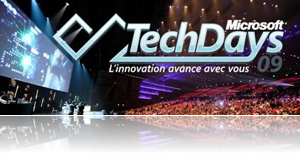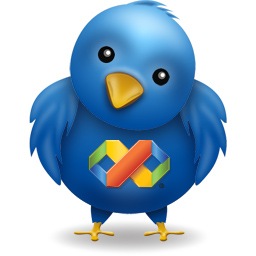 On Tuesday February 10th I’ll be popping over to Paris where I have the privaledge of being invited to speak at TechDays 09 courtesy of Microsoft France. Luckily it is a session close to my heart as the title is “Interopérabilité avec Visual Studio Team System” which I hopefully know something about :-)
On Tuesday February 10th I’ll be popping over to Paris where I have the privaledge of being invited to speak at TechDays 09 courtesy of Microsoft France. Luckily it is a session close to my heart as the title is “Interopérabilité avec Visual Studio Team System” which I hopefully know something about :-)
I’ll be around all day, hanging out at the partners booth in the Development Village. If you are coming along to TechDays09 in Paris then please stop by the booth and say “Hi”. The limits of my French speaking stop at ordering a ham and cheese baguette so I’ll likely be the guy in the corner smiling politely and quietly not understanding a word of what is going on. If you come and take pity on me it would be much appreciated.
Many thanks to Eric Le Loc’h and Microsoft France for inviting Teamprise to come present, and for positively encouraging me to do the demos from my Mac.
Interopérabilité avec Visual Studio Team System
animé par Eric Le Loc'h , Martin Woodward
Niveau : Découverte (100)
Le mardi 10 février 2009, 16H00- 17H00.
Cette session aborde les questions d'interopérabilité entre Visual Studio Team System et les environnements Eclipse, J2EE. Visual Studio Team System est la solution d'industrialisation des développements de Microsoft. Beaucoup de clients standardisent les plateformes de développement et les outils associés. Leur souhait est d'avoir une seule usine logicielle pour leurs environnements de développement. Nous allons présenter la société Teamprise qui propose des outils pour accéder aux fonctions de Visual Studio Team System dans Eclipse pour les développeurs J2EE, sur Linux, Unix et Mac pour les designers par exemple. Cette intégration est poussée : Client riche pour se connecter au serveur Team Foundation, gestion des éléments de travail, lignes de commandes, intégration continue de code J2EE, JUnit, intégration avec Maven. En fin de session, nous balaierons les possibilités d'intégration/d'interopérabilité de Team Foudation Server. La session sera illustrée par des démonstrations des outils de Teamprise.
I’ll update this post after my session with my slide deck and and links to resources that I may end up promising to look up during the Q&A.



